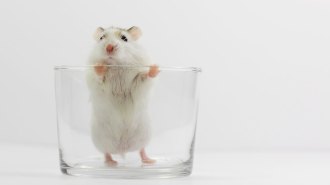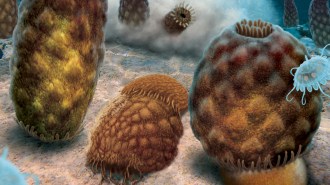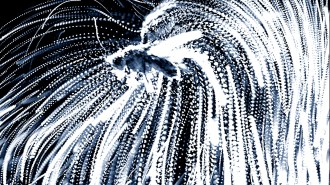News
-
 Health & Medicine
Health & MedicineA hormone shot helped drunk mice sober up quickly
Drunk mice injected with the hormone FGF21 woke up and regained their balance faster than inebriated mice that did not receive the shot.
By Freda Kreier -
 Space
SpaceA crucial building block of life exists on the asteroid Ryugu
A sample from Ryugu collected by Japan’s Hayabusa2 spacecraft contains uracil, a component of RNA, which is found in all living cells.
-
 Health & Medicine
Health & MedicineU.S. cases of a deadly fungus nearly doubled in recent years
Though numbers are still small, clinical cases of Candida auris in the jumped 95 percent from 2020 to 2021, a CDC survey finds.
-
 Astronomy
AstronomyThe mystery of Christiaan Huygens’ flawed telescopes may have been solved
The discovery of Saturn’s largest moon, Titan, may have come despite its discoverer, Christiaan Huygens, needing eyeglasses.
-
 Paleontology
Paleontology310-million-year-old fossil blobs might not be jellyfish after all
An ancient animal called Essexella may have been a type of burrowing sea anemone, a new study proposes.
By Meghan Rosen -
 Climate
ClimateBy flying over atmospheric rivers, scientists aim to improve forecasts
Drenching atmospheric rivers are slamming the U.S. West Coast, bringing needed water but dangerous flooding. Here’s how scientists study these storms.
-
 Agriculture
AgricultureMartian soil may have all the nutrients rice needs
Experiments hint that in the future, we might be able to grow the staple food in the soils of the Red Planet.
By Nikk Ogasa -
 Earth
EarthEarth’s inner core may be more complex than researchers thought
Seismic waves suggest that Earth has a hidden heart, a distinct region within the solid part of the planet’s core.
-
 Physics
PhysicsStatic electricity helps parasitic nematodes glom onto victims
The small electric charge generated by a moving insect is enough to affect the trajectory of a parasitic nematode’s leap so it lands right on its host.
-
 Health & Medicine
Health & MedicineMaternal deaths in the U.S. keep climbing
New U.S. data show that as maternal deaths rise, a large gap between the maternal mortality rate of Black women compared with white women persists.
-
 Planetary Science
Planetary ScienceA volcano on Venus was spotted erupting in decades-old images
A new look at old data reveals an eruption on Venus in the 1990s that was probably similar to Hawaii’s Kilauea eruption in 2018.
-
 Earth
EarthA moon-forming cataclysm could have also triggered Earth’s plate tectonics
Deeply buried remnants of a hypothetical planet that slammed into Earth 4.5 billion years ago might have set subduction into motion.
By Nikk Ogasa